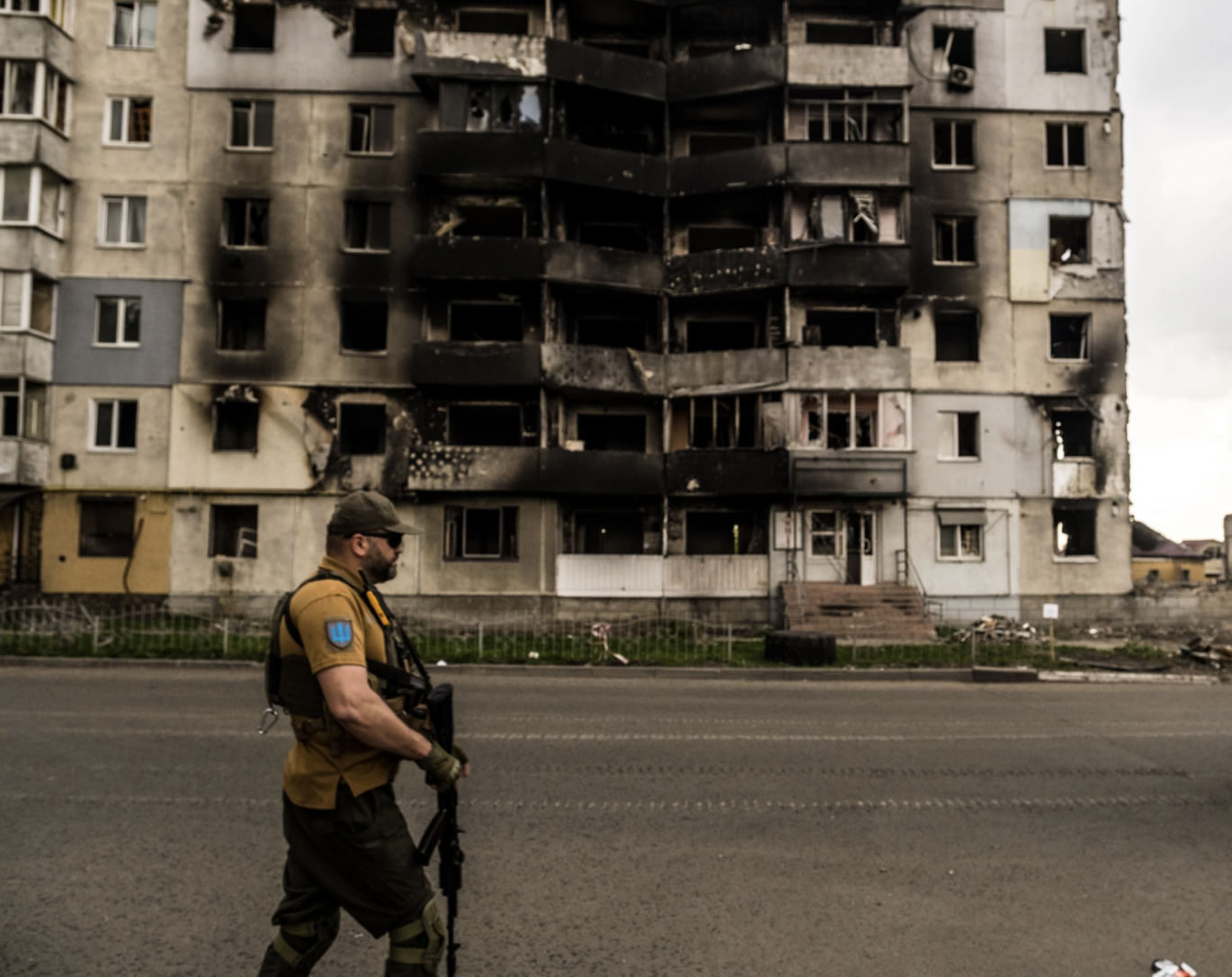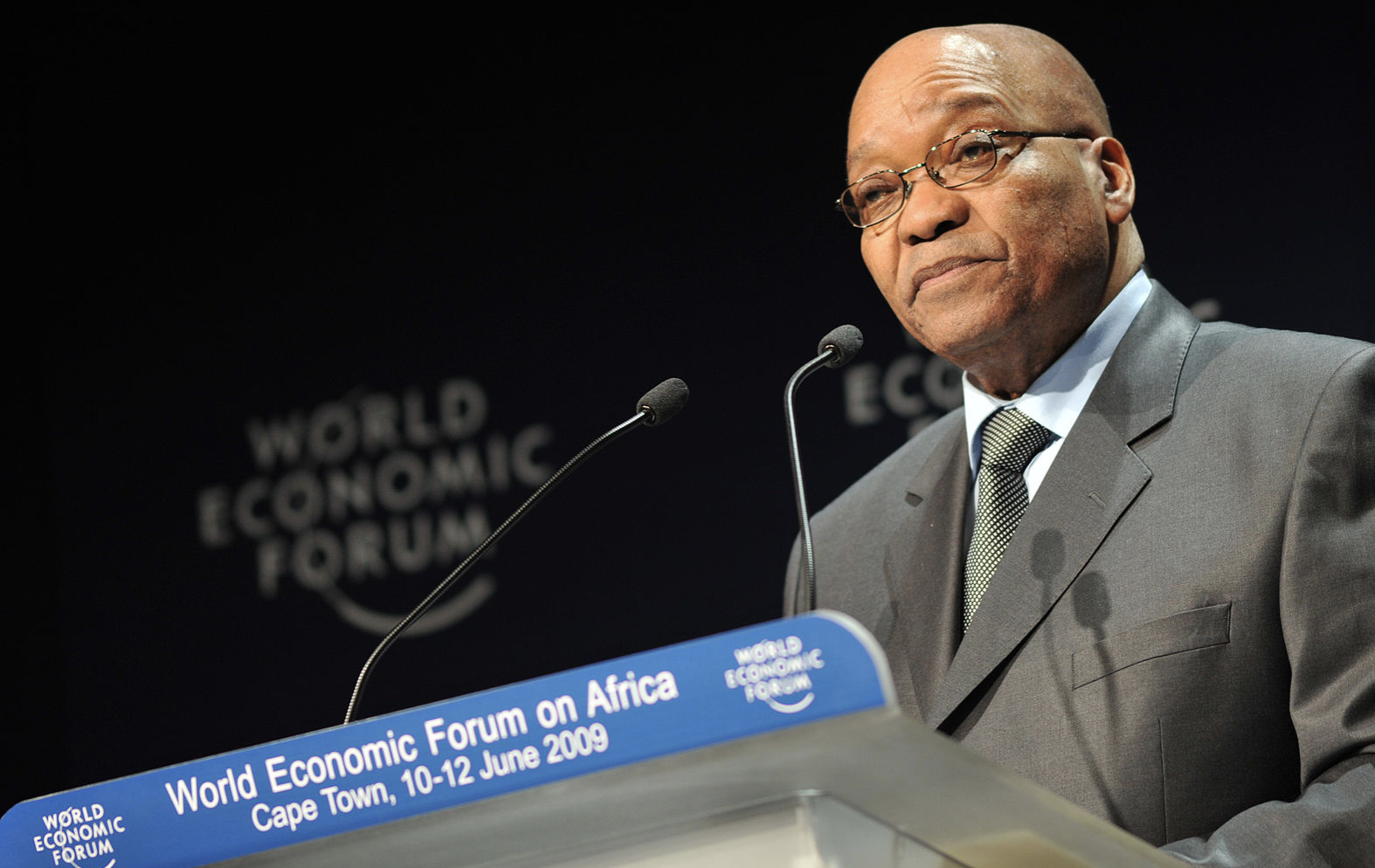News
What's at Stake in Ukraine? A Dispatch from a Country Fighting for its Very Existence
Amid rumours that Vladimir Putin might use his 9 May Victory Day parade to launch a wider war on Ukraine, an assessment of what's at stake for Ukraine, Russia and Africa. Greg Mills writes from Kyiv.

This war is personal.
The walk up the hill to the presidency in Kyiv from Maidan square is lined with black-and-white pictures of soldiers who have lost their lives in defence of Ukraine since the Russian invasion on 24 February. In the west, the landings on the grand marble staircase in the governor's offices in Lviv are dotted with pictures of the families of servicemen and women who have lost their lives defending their territory.
If you missed these and the similar photographic collages, you could not miss the thousands of “Czech hedgehog” anti-tank barricades, military and police checkpoints, and sandbagged bunkers, shopfronts and metro stations, along with the burnt-out tanks and other detritus of war now lining the intended Russian route into Kyiv in the early days of this war.
It's a sombre reminder of the human cost of war, and of the pain and suffering of those dealing with the aftermath.
But it is also personal in other respects.
On the Ukrainian side, Volodymyr Oleksandrovych Zelensky has epitomised Ukrainian resistance to Russian aggression. He represents a deep well of patriotism, however, derived from thousands of years of history and today swelled by Russia's actions. There is not a Ukrainian you will meet, no matter their political persuasion, who is unaffected, whether refugees from Mariupol, Kharkiv and elsewhere which have been devastated under Russian bombardment over the past 70 days, or citizens of Kyiv or Lviv. Tears and anger are close to the surface.
Tanya (23) is a guide at the Holodomor memorial in the capital, originally from a town close to Odesa where her mother and brother still live. “I am sad,” she says in response to the lack of sympathy expressed internationally to Ukraine's plight, before correcting herself, choking back the tears.
“I am angry,” said the French and English university graduate since “again”, she said, referring to the famine engineered by Stalin which killed as many as five million Ukrainians in 1932/3, “they don't remember Ukraine”.
Olexandr Feldman is, he emphasises, a “Jewish-Ukrainian” businessman-turned-MP who started an Ecopark for breeding endangered species in his native Kharkiv. Tears rolled down his cheeks as he described how hundreds of animals had been indiscriminately killed in the Russian advance.
For President Vladimir Putin, too, the war is geo-personal more than it is geo-political. It is a way to return to the Soviet Union. On the launch of the invasion, he stated that his goal was to “demilitarise and de-Nazify Ukraine”, the more immediate pretext given as “the forces that staged the coup in Ukraine in 2014”, referring to the toppling of the pro-Moscow president Viktor Yanukovych. At a rally in Moscow this March to celebrate the 8th anniversary of the seizure of Crimea from Ukraine, Putin said the operation in Ukraine was necessary because the United States was using the country to threaten Russia and they had to defend against the “genocide” of Russian-speaking people by Ukraine.
Ukrainians see this, however, as just the latest in a centuries-old attempt to subjugate their culture, language and independence.
“There is no doubt”, says Dr Hryhoriy Nemryria of the Foreign Relations Committee in the Ukrainian Rada (Parliament) that “Putin's ambition is to get Ukraine under a Russian flag, based on his conviction that there is no such thing as Ukrainian and no such people as Ukrainians”.
Ukraine's army has fought very well in the first two months of the war. It is quite a different force from the one that lost territory in the east and Crimea to Russia in 2014. Since then it has retrained, expanded and rearmed, extracting huge costs on the invading force. Perhaps as many as 15,000 Russian soldiers have died with possibly three times the number of wounded, the Ukrainians claiming they have knocked out and captured more than 1,000 tanks and as many as 350 Russian helicopters and aircraft.
Western sources can photographically account for as many as 1,500 Russian tanks and transports destroyed or captured along with nearly 120 aircraft.
These figures also do not account for the damage that the Ukrainians have done to Russian supply dumps and command and control centres, the latter indicated by the high number of senior Russian commanders who have died so far.
Ukraine is a nation at war, with a mindset to suit. Outside the town hall in the centre of Lviv is the tailplane of a Sukhoi Su-35, complete with a QR code to donate to www.buymeafighterjet.com.
And yet, Ukraine has paid an enormous price, as the photographs in the governor's office hint, with perhaps as many as 4,000 military deaths and 50,000 civilians. No one will likely know the exact grim tally, not until scenes such as Mariupol are open to international observation, which is possibly never, given likely Russian control.
Another measure is in the number of displaced people: more than a quarter of Ukrainians — 13 million people — have been turned into international and external refugees, five million of whom have left the country and half of this number, in turn, to Poland. In the first weeks of the war, more than 600,000 refugees passed through Lviv, a region which now accommodates half a million more than at the start of the war.
The damage to Ukraine's infrastructure is estimated at $100-billion while the government — where the GDP was $165 billion before the war — is running a monthly deficit of $6-billion, reflecting lower incomes, falling taxes and increased defence costs.
Russia, claims Kyiv, has launched about 2,000 missiles into Ukraine since 24 February.
International aid helps, but Ukraine will have to recover its pre-war productivity, and that demands opening up its export links with the rest of the world, particularly of agricultural commodities. It's very difficult to envisage this with the Russians having effectively seized the coastline east of Crimea and blockading Odesa. Ukraine has to export as much as six million tonnes of grain monthly to keep ahead of its enormous productive capacity. Already as much as 30 million tonnes are backed up within Ukraine awaiting export.
The threat to the east and south is not just about transport, however, but also energy. Ukraine has Europe's second-largest natural gas fields after Russia, from which it draws three-quarters of its own energy needs. These are now at risk, as potentially are Ukraine's nuclear power facilities as a possible target for Russian missiles.
Ukrainians see little option other than stopping and then expelling the Russian forces. “It's not about peace,” says Ivanna Klympush-Tsintsadze of the Parliamentary Committee for Ukraine's Integration into the EU, “but about victory”.
They have every motivation for doing so, not least in that they are fighting on their own territory and have the encouragement of recent military success. Evidence of Russian atrocities at Bucha and the devastation of Mariupol, Kharkiv and elsewhere means, too, “that Ukraine won't allow Putin to get away”, says Roman Shepelyak, international relations director in the oblast of Lviv. “Appeasement won't work by giving him another two regions to try and make peace. He will just regroup, and relaunch this in a few years.”
But Ukrainians are aware that they are fighting a ruthless and cunning enemy, and that they don't have the resources of Russia, one that currently earns more than a billion dollars a day from oil and gas exports alone. What would happen if Putin won the war, if Kyiv crumbled, ground into a pulp by the sheer weight of numbers and Russia's lack of restraint?
“It is the difference,” says Pavlo Sheremeta, the former Minister of the Economy and Trade, “between Ukraine's future and Russia's past”.
It's a future defined by closer ties with Europe with all its economic opportunities and governance norms, and Russia's rearward view of security through might. While some, including President Joe Biden, have said that this is a fight between democracy and autocracy, it is more than that. It's a world in which sovereign norms would not ensure security, where multilateralism would offer few guarantees against foreign interference.
There is also no evidence that Putin would stop there, the way he was encouraged in this by the limp Western response to Russian intervention in Georgia in 2008 or Crimea six years later.

This is a struggle for the type of world we want to have.
Yet if the UN vote against Russia is any gauge, 60% of the world's population (or at least their leaders) wants to remain out of this fight. That they represent just 30% of the world's economic wealth hints at one reason for doing so: that the world is an unfair place, seemingly less concerned with the plight of the world's poorer people than those in Europe or North America.
“We are not just fighting for our freedom,” reminds Lviv's Mayor, Andriyy Sadovyy, “but we are fighting for your freedom as well.” Or as the Rwanda-Ukrainian (and Olympic gold medallist and now MP) Zhan Beneliuk has put it, “I am thinking about [the next Olympics in] Paris. But we must fight now for the most important medal, for our country. When I think of Rwanda, I think of Ukraine, and of the first problem in both cases, that people don't do anything to intervene.”
At the very least, peace is in the majority of people's best interest. Outsiders can help pressure for peace in several ways, which would contribute to ending the Russian invasion and occupation, and in ways which would also serve their self-interest.
First, to double down on multilateral engagement, in part to ensure that this system is strengthened and reset as a consequence of this failure. This can start at the African Union, by sending African fact-finding missions to Ukraine (and to Moscow if need be, though Ukraine has not invaded Russia), and by having the two presidents speak to the AU.
Second, to open up the port of Odesa for trade, under international supervision, reducing the commodity squeeze on vulnerable African communities, among others.
Third, to support a call for an investigation into war crimes, ensuring that human rights are both indivisible and common across people.
And fourth, to raise the volume in a call for the withdrawal of Russian forces at least to pre-24 February borders, without which there is no alternative for Kyiv but to fight on.
The moral imperative is clear.
Vitali Klitschko, the former world heavyweight boxing champion and now Mayor of Kyiv is forthright, as perhaps is expected.
“I was [in Bucha] the second day after the Russians moved. You see the bodies. You smell the bodies. You see how many people died… Russians have to understand [that] they have made a mistake… My message to everyone, if you send money to the Russians, you support the war, this bloody money, and this money has Ukrainian blood… We are fighting right now to defend not just our houses and our families and our children, but we defend our values and our principles.”
Absent overwhelming pressure for peace in upholding this moral imperative, further war seems inevitable.
In his March Moscow address, Putin cited Russia's 18th-century naval commander, Fyodor Ushakov. “He once said that these thunderstorms will bring Russia glory,” said the Russian president. “That is the way it was then, that is the way it is now and it will always be that way.” This suggests that more bitter fighting lies ahead as he tries to impress his view of the world and Russia's place in it.
This article originally appeared on the Daily Maverick


